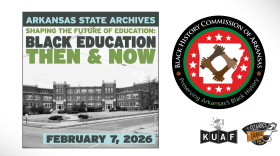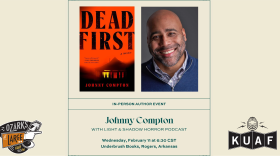The University of Arkansas–Fort Smith has announced that Emily Tredaway will be the director of their new Center for Nonprofits. Emily joined me over Zoom yesterday to discuss the new role and her history working in the nonprofit world in the River Valley. She says her first introduction came through an internship while she was a student at UAFS.
Emily Tredaway: And then I started volunteering with a group—the Junior League of Fort Smith. Then I began working at The CALL, which is another nonprofit. I really didn’t have any intention of working in the nonprofit space, but it just kind of kept coming back into my life. I just really enjoyed it and found it interesting.
Kellams: What made you decide to stay in that world?
Tredaway: Well, it kind of hits close to home for me. I have a very large family, and a lot of them struggle with different things and have used different, you know, social help they’ve needed. So it’s always been a part of my life that I’ve seen personally. I’ve actually had family members end up in foster care. It really just, like I said, kept coming back into my life. And I really enjoy advocating and being a voice for those who can’t stand up for themselves—or maybe don’t have the opportunity to speak up for themselves. Providing that voice is important to me.
Kellams: You talk about advocating, and I think that’s one of the terms we really associate with the nonprofit world. What specific areas of advocacy really stick out to you and drive the work you do?
Tredaway: I’m a big advocate—probably through my work over the last eight years with The CALL—for children and families. Kids are the most vulnerable in our community. They can’t speak up for themselves. They can’t drive away from an abusive situation. They can be kind of stuck where they’re at. When you live with those stories and hear the things these kids go through, that really pushes you to speak for them and do what you can to help them—and help their families become better parents. That was really my step into this field.
Now I’m looking forward to broadening that. My experience has been mostly with children and families, but through the new Center for Nonprofits, I can work with all different kinds of nonprofits. I’m looking forward to reaching out to all kinds of people.
Kellams: That ties in really well to my next question. In April, UAFS announced a $7.5 million gift to launch the Center for Nonprofits. At what point in the process did you begin to consider applying for the director role?
Tredaway: As soon as I heard about the opportunity, I immediately wanted to get involved. Blake Rickman from the Foundation came to one of the River Valley nonprofit meetings, and he was just talking about it: “Hey, we just got this money and this is what we’re looking for.”
Honestly, I heard this voice that said, “You need to apply for this.” So I immediately started texting a friend who works at the Foundation, like, “When is the application available?” I applied back in April when they first announced it. It’s been a long process, but as soon as I heard about it, I knew I wanted to do it. I had a ton of ideas and I’m very excited to be here.
Kellams: Why you?
Tredaway: (Laughs) I’m lucky, I guess. No, I think I’ve had the experience—lots of experience with different nonprofits, especially through my work at The CALL and the Junior League of Fort Smith. We partner with lots of different organizations.
And I’m an advocate. That’s my personality. When I walk into a room and there’s the weird kid in the corner, that’s where I go. I want people to feel included. I want everyone in the room together. I want everyone to feel like they’re part of something. I think it’s just part of who I am to advocate and speak up for people.
Kellams: What does it feel like to be the executive director of a brand-new project? There’s no playbook or predecessor. You get to set the trail here.
Tredaway: Yeah, and I love that. I came in really strong with a whole plan of what I thought it could look like. I think I’m going to enjoy being able to set all that up from the beginning.
I have a lot of good organizations around me—other nonprofits I can look to. Here at the Center for Economic Development, we have the Small Business Institute and the Family Enterprise Center. A for-profit business is similar to a nonprofit, even though we’re not making money. I’ve been leaning on them—seeing how they handle membership, how they handle different things—and kind of copying those ideas, tweaking them for the nonprofit space. I’m really excited about it.
Kellams: In your opinion, what’s the difference between working for a nonprofit and working with nonprofits—which is more in line with your current role?
Tredaway: It’s been a bit of a learning curve to step back. When you’re working for a nonprofit, your client is the families in need, or the children in need—whoever it is you’re serving. You’re focused on how to help them directly.
Now in this position, I have to take a higher-level view. How can I help the nonprofits help the people they serve? We’re going to do some listening sessions—sit down with local organizations and hear from them: What do you need from us? What are you struggling with? That will help us build our programs.
Kellams: There’s also an academic component—integrating faculty expertise through a partnership with the UAFS Department of Social Work. Can you talk more about that?
Tredaway: Yes. The second part of the Center is our partnership with the Department of Social Work. Through the gift, we can award stipends for students. The internship program already exists, but many of them go unpaid because our nonprofits can’t afford to pay them.
With this funding, the student can be paid without the nonprofit footing the bill. My first internship at UAFS was unpaid. I was lucky I could do that, but not everyone can. So we’re excited to offer that opportunity—so students can get real-world experience and also get paid. Everybody needs to pay their bills.
It’ll also give our faculty opportunities for research. There’s some missing data here locally. When we gather that data and faculty analyze it, we can start identifying real needs, and use that to help with grants and other support for nonprofits.
Kellams: And I imagine being able to pay interns makes the opportunity more accessible for students who otherwise couldn’t take an unpaid position?
Tredaway: Definitely. We hear that a lot in the nonprofit space—this idea of “Well, you’re doing good work; you should just do it for free.” But that’s not realistic. There are great people who can do great work, but they can’t do it for free.
We’re excited to offer stipends and allow students to see all the different opportunities out there—especially for social workers. There are lots of different paths they can explore, and this gives them a chance to try that out and see what works best for them.
Kellams: Emily, what scares you the most about this job?
Tredaway: What scares me the most is the fear of failure. This is brand new, and there’s a lot of excitement around it. Nonprofits are already reaching out—I’ve heard from more than 20 organizations.
They’re excited for help. But if I can’t help them, if they go under or can’t find funding—that’s what scares me. You can write grants and reach out, but nothing guarantees you’ll get funding. And there’s only so much financial support in the Fort Smith area.
How does everybody get what they need without draining the system? I really want to help, and I hope I can.
Kellams: And what excites you the most?
Tredaway: The opportunity. In the spaces I’ve worked, it’s hard to be in a nonprofit. You carry so much—you have to fundraise, figure out how to pay your staff, worry about laying people off if that grant doesn’t come through. And you’re hearing traumatic stories from clients. Then you have to smile for a photo or do a radio interview.
It’s hard. So I’m really looking forward to sitting down with people one-on-one and saying, “Tell me your problems. We can cry about it together. Then we’ll pull our boots on and get to work.”
It’s making me emotional just talking about it. I want to be a source of strength and comfort. I know a lot of nonprofit leaders personally—we’re friends. Being able to pour into them and lift them up is probably going to be my favorite part.
Kellams: Emily Tredaway is the director of the Center for Nonprofits at the University of Arkansas–Fort Smith. We spoke over Zoom yesterday.
Ozarks at Large transcripts are created on a rush deadline. Copy editors utilize AI tools to review work. KUAF does not publish content created by AI. Please reach out to kuafinfo@uark.edu to report an issue.








